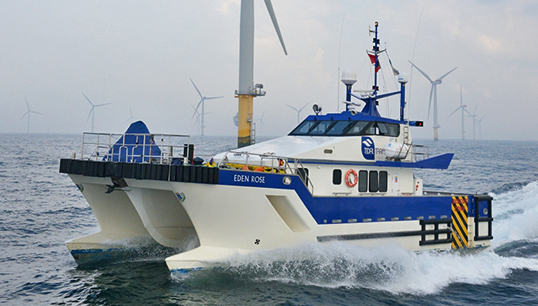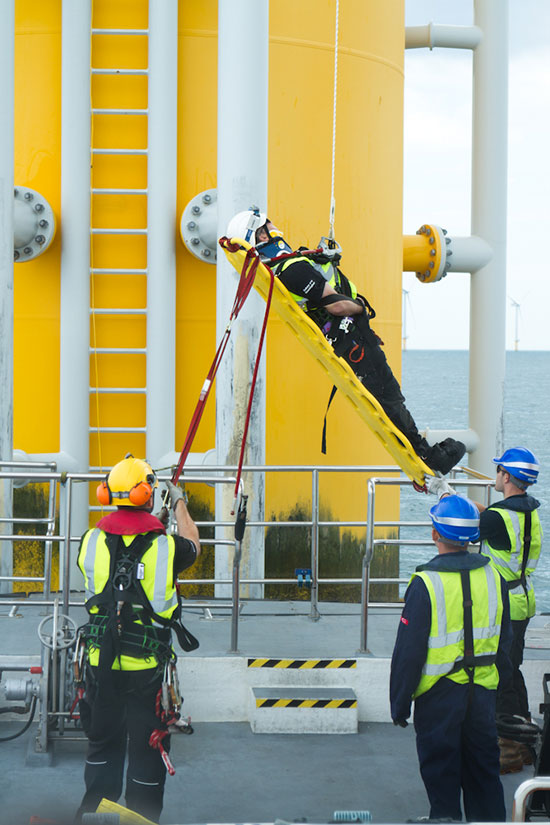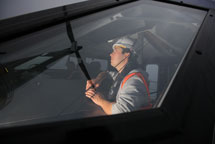- Topics
- Campaigning
- Careers
- Colleges
- Community
- Education and training
- Environment
- Equality
- Federation
- General secretary message
- Government
- Health and safety
- History
- Industrial
- International
- Law
- Members at work
- Nautilus news
- Nautilus partnerships
- Netherlands
- Open days
- Opinion
- Organising
- Podcasts from Nautilus
- Sponsored content
- Switzerland
- Technology
- Ukraine
- United Kingdom
- Welfare

Rob Coston speaks to Kerrie Forster, CEO of the Workboat Association, about opportunities for seafarers in offshore wind
When Boris Johnson announced that his government would make Britain 'the world leader in clean wind energy' at the Conservative Party Conference in October, there was some scepticism.
His commitment to offshore wind – part of the government's pledge to reach net zero emissions by 2050 – involves a £160 million investment in ports and factories and will create 2,000 jobs in construction and support 60,000 more, according to the prime minister.
Yet only seven years ago Johnson described wind turbines as 'moaning seagull-slicers' that couldn't 'pull the skin off a rice pudding' So how likely is his government to deliver?
According to Kerrie Forster, CEO of the Workboat Association, 'very likely'.
Money and jobs

Forster, who took on the role of CEO almost two years ago, is head of the trade, skills and safety standards association for the workboat industry, a body that represents over 150 organisations, collectively operating more than 650 vessels.
He believes that offshore wind is extremely attractive to the government for two crucial reasons: money and jobs:
'This is an industry that brings new money to the UK – we are one of the world leaders in terms of numbers of turbines in the water – but there is no UK wind park owner or operator. That can be a double-edged sword, but it does mean that a large slice of the billions being invested is non-UK money, which means more going into the UK pot.
'Secondly, in previous years the country has invested highly in the development and futureproofing of container ports and passenger terminals. Once your facilities get above a certain size, if you increase the number of containers coming into a terminal it doesn't always directly affect employment substantially; in general you have the same amount of equipment and people, they're just working a bit smarter and harder often helped by automation or specialist equipment. So that kind of growth doesn't change local economies – we don't employ thousands of stevedores anymore.
'Offshore wind, on the other hand, requires renovation of facilities. It has already been seen regenerating ports and coastal communities over the past few years; Grimsby is a classic example. We also have a fantastic national shipbuilding strategy being developed, and I hope this will include many support vessels being built here for offshore wind. The UK is the leader in small vessels for this market – this industry needs to expand and vessels must grow in size and complexity to meet both UK, European and indeed global objectives.'
Green growth for seafarers
There was already an estimated £24 billion invested into offshore wind during the 2010s, according to energy analysts Aurora, with twice that needed to meet the government target of 40 gigawatts generated annually by 2030. If the money does come through seafarers will be much in demand to support offshore projects.
'Short- and medium-term we will need more and more seafarers,' says Forster, though he does express some fears for international employment if Covid travel restrictions are tightened even further.
The question is, where will they come from? Some may follow the traditional route of joining from other sectors of the maritime industry. When asked about the opportunities for seafarers who would like to move across from similar spheres – such as oil and gas – the Department for Transport pointed out the wording of the Offshore Wind Sector Deal agreed between the sector and government, announced in March 2019: 'The sector will establish an Investment in Talent Group … who will identify skills needs across the sector and develop curricula and accreditation to deepen the skills base. This includes developing an Offshore Energy Passport (recognised outside the UK) to accredit offshore workers and facilitate job-mobility between offshore renewable and extractive industries. It will also develop a mechanism to more easily facilitate the transfer of former military personnel with appropriate skills into the industry.'
This work is being taken forward by the sector, rather than government. The latest progress report, which covers the period to October 2020, shows that people have been appointed to try and build skills in offshore wind, diversity initiatives have been created, and models and reporting have been established; however, little action appears to have been taken so far except creating a LinkedIn group for former military personnel and setting a target for apprentices across the workforce to help people gain new skills or transition from other sectors. Discussions with training providers about the creation of an Offshore Energy Passport are ongoing.

These efforts might not yet be pushing seafarers to transition into offshore wind. Could high wages and good conditions pull them in?
Unfortunately, price pressures and the determination of energy providers to bring down the cost of renewables mean that rates of pay may not always be especially competitive compared to other known offshore contracting industries, though Forster does say that if day rates on vessels were to go up, there is a desire in the sector in general to invest more in its seafarers.
In addition, the sector has sometimes been troubled in the past with issues around minimum manning, work and rest hours and casual recruitment, as previous Telegraph articles have shown. How does an association which does not represent the entire sector encourage better behaviour?
'We would be kidding ourselves to deny there are those operators out there which do things with less regard for high operating standards. We don't necessarily have any minimum requirements to join [the Workboat Association], but I would say it's like with your children – you work with the older or cleverer kids in the family to try and have a positive effect on the others – they are the role models.
The first step is getting organisations to join, then getting them to mix with the right companies and role models, and finally nurturing them and providing that extra experience, all to get them to want to raise their standards to the common industry expectations.'
The Nautilus perspective
While the WA works to improve standards from the industry side, Nautilus International's UK and Netherlands branches are also seeking better standards for the benefit of this growing workforce. They hope for greater collaboration to achieve this.
In the UK, Nautilus head of recruitment and membership Derek Byrne notes that pay and conditions for workers aboard more specialised craft are competitive already, but that the challenge for the Union is to reach and assist workers aboard small crew transfer vessels.
While Nautilus UK seeks to work with the WA to raise standards, the Dutch branch must deal with the fact that there is no equivalent organisation in the Netherlands.
'Wind energy is high on the agenda of the Dutch government. It's a big industry that is still growing and there is a lot of investment,' says industrial organiser Michel Steketee.
'However, our work in the sector currently isn’t on a large scale because it seems that the government is more interested in generating renewable energy rather than workers' rights in the sector. There is no organisation like the WA here, so we approached employers and the Dutch government on a national level. We tried to get a foot in the door by arguing that it’s not only about environmental sustainability but also social sustainability for the employees, but we haven't succeeded as yet.
'After trying to approach the issue from above, we are now tackling it by coming up from the work floor. For example, last year we had a lot of contact with crews at a large maritime support provider because they were not being compensated for spending longer periods aboard – we had some success there as the company has agreed to pay for the extra days.'
For now, the Netherlands branch is working at company level, but this is difficult as some of the larger companies are not yet convinced about cooperating with unions in the sector. That means going to see members and potential members from small vessels at the harbour, which is impossible now due to Covid restrictions.
In the UK and in the Netherlands, the aim is for industry organisations to come together in dialogue with unions to improve conditions across the board. 'Our big hope is to make an agreement at a sector level,' says Mr Steketee.
- More information on joining the workboat sector or transitioning within the maritime industry can be found at www.maritimeuk.org/careers
We are working hard to attract second career joiners and young entrants

Would you work on a wind farm?
If there are new jobs available in offshore wind, will seafarers really want to take them?
For many years, the sector has relied on the skills of people from elsewhere in workboats such as oil and gas, as well as young people joining the industry and people starting a second career, for example, after serving in the forces. Other joiners might have volunteered with the RNLI or enjoy operating pleasure craft in their spare time, as was the case for Workboat Association CEO Kerrie Forster 17 years ago.
'We are working hard to attract second career joiners and young entrants,' Forster says. 'For example, we would like to encourage cadets to join, as a lot of times companies in other sectors are training people up and giving them fantastic skills when there's no job at the end of it. I and many others think we could be bringing them in and provide them not only a wage but skills from small vessels, all while waiting for that dream opportunity on a larger vessel. Some of them might say "I quite like towing or working in offshore wind, I'm going to stay there", but either way we've given them the next step in their progression or giving them a career.'
Experienced seafarers may be more difficult to bring in long-term, however.
'With Brexit the sector has opportunity to hire from within, but we don't expect that most of the seafarers sitting at home will want these jobs. We mostly can't convince someone from a large vessel background, who has existing expectations, to be satisfied with the challenges on a workboat.
'For example, an engineer from a large ship who finds they're only allowed in the engine room three times a day for inspections won't be nearly challenged enough. Many of the people who have come from superyachts or cruise ships go back when they can because of the attraction to grandeur.
'It's not where their interest is and it's not the financial reward they are used to. So unfortunately, the workboat sector will not solve seafarer unemployment as a result of the temporary collapse of cruise, for example.
'Maybe for one in five seafarers it will be the right move, though – for those who are looking to work closer to home for example. It's reliable work, it's long term, and of course, there's a trade-off with how much additional time you get to spend with family and friends.'
After the crew change crisis, that final point might be the clincher for those who want to stay in maritime but no longer relish the prospect of months onboard a deep-sea vessel.
Image: Tidal Transit, Sheringham Shoal Offshore Wind Farm, by Jiri Rezac
Tags
